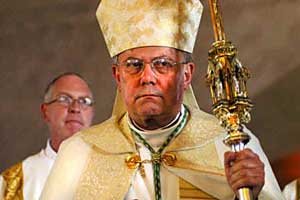-
- San Francisco archbishop picked as Vatican enforcer
- Senate Democratic leader offers to confirm three judicial nominees as peace
- Talking marriage, on the Mass. gay dating scene
- Openly gay legislators often fight solitary battles
- Newspaper: Spokane mayor concedes more abuse claims likely
- Sweating out sexual orientation
- National News Briefs
- World News Briefs
national
San Francisco archbishop picked as Vatican enforcer
William Levada criticized for response to sex abuse
Published Thursday, 19-May-2005 in issue 908
SAN FRANCISCO (AP) – Archbishop William Levada, who catapulted May 13 into the most influential Vatican post ever held by an American, has a track record of upholding Roman Catholic policies while deftly handling controversy.
But his appointment as the chief enforcer of church doctrine was sharply criticized by clerical sex abuse victims, who say he’s done a poor job of dealing with the crisis. Levada countered that his experience with the issue is an advantage for the church.
The 68-year-old leader of the San Francisco Archdiocese was named by longtime friend Pope Benedict XVI as his own replacement leading the powerful Congregation for the Doctrine of the Faith.
The congregation is responsible for policing and enforcing church doctrine. Among other things, it examines writings contradicting church teachings and crimes against faith, morality and the sacraments.
It also reviews all sex abuse claims against clergy, to see whether a priest should be forced out, given a church trial or found innocent.
The Survivors Network of those Abused by Priests said Levada has been “slow to act, harsh to victims and committed to secrecy” in responding to molestation claims.
Last year, James Jenkins, chair of a watchdog panel Levada formed to review claims against priests in San Francisco, resigned in protest.
“It’s what [Levada] calls an independent review board. I believe it’s compromised. We were manipulated,” Jenkins said. “What started out as a good faith effort devolved into something that was nothing more than an elaborate public relations scheme.”
Levada called the criticism “off the mark.”
“Any reports I have read from this organization, SNAP, are consistent with their policy of trying to accuse the bishops and me of malfeasance. It’s simply incorrect and false,” he said.
“It is precisely the knowledge of our present situation in this terrible issue of sex abuse that’s so important for the prefect of the congregation now responsible for making sure that these things are handled in the proper manner.”
Levada served on the commission of U.S. bishops and Vatican officials who oversaw revisions to the discipline plan the American bishops had adopted for sexually abusive priests in 2002, with changes meant to protect clergy due process rights.
Leader of the San Francisco Archdiocese since 1995 and the Archdiocese of Portland, Ore., before that, Levada was credited by Catholic experts with brokering deals on thorny issues that upheld orthodox church teaching without creating controversy.
“Certainly, he’s a conservative, but he knows what battles to pick,” said David Gibson, a former Vatican radio newsperson and author of The Coming Catholic Church. “I think there’s a pragmatism that comes with pastoral experience.”
Levada served on a task force formed by the U.S. bishops to address the debate that erupted last year over whether Catholic politicians who support abortion rights should receive Communion. That panel left the decision up to individual bishops.
Levada issued a nuanced statement saying parishioners must accept Catholic teaching that abortion and euthanasia are evil to be in full communion with the church. But he did not say directly that he would deny the sacrament to dissenting politicians.
In 1997, he reached a compromise with then-Mayor Willie Brown over a local domestic partner law under which Catholic Charities was required to provide health insurance and other spousal benefits to gay and unmarried partners of its employees.
Levada sidestepped the gay issue by emphasizing that health coverage should be available to everyone, and helped convince the city to broaden the requirement so that any member of a household – including blood relatives – could receive benefits.
Some conservatives were unhappy about that deal but he also has been praised for his position on other issues.
In a 1994 paper, Levada took a dim view of the pick-and-choose attitude of many Catholics toward church teaching. “Such a ‘cafeteria’ approach to the faith has no basis in Scripture or the church’s tradition,” he wrote.
Levada was the only American on the seven-bishop editorial committee that produced the 1992 Catechism of the Catholic Church, a guide to Catholic beliefs.
Catholics for the Common Good, a local group that supports church social teachings, praised Levada for taking courageous stands in a city “where the church is deeply opposed and is frequently openly mocked and abused.”
After he met with Benedict on May 3, there was widespread speculation that Levada would take over as prefect. He said when Benedict offered him the job in his office that day, his tongue-in-cheek response was “Oh, Holy Father, not me.”
He worked with then-Cardinal Ratzinger briefly when he served as a staff member at the Congregation for the Doctrine of the Faith from 1976 to 1982. He’s also been a member of the congregation since 2000.
“No doubt his choice of me is due in part to my familiarity with the work of the congregation,” Levada said. “His choice is also a tribute to the church in the United States and a recognition of our important contribution to the work of the universal church.”
Levada’s resignation in San Francisco is effective Aug. 17, his 10th anniversary in the position.
|
|
Copyright © 2003-2025 Uptown Publications


